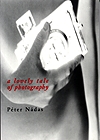A LOVELY TALE OF PHOTOGRAPHY: A FILM NOVELLA
There are plenty of critics out there who'd be happy to savage this book.
 The kind who love
to take any opportunity to trivialize experimental writing, even while
granting that it may, in more benighted times, have served a
purpose--though god knows it's only an indulgence today. These are the
critics who point out their beloved naturalistic moments in David
Foster Wallace then heave a sigh at having to sidestep all the
metafictional masturbation to get to a moment or two of sharply
rendered detail. Nothing wrong with enjoying a moment of recognition,
but I can't help but think that something has damaged these critics'
sense of curiosity.
The kind who love
to take any opportunity to trivialize experimental writing, even while
granting that it may, in more benighted times, have served a
purpose--though god knows it's only an indulgence today. These are the
critics who point out their beloved naturalistic moments in David
Foster Wallace then heave a sigh at having to sidestep all the
metafictional masturbation to get to a moment or two of sharply
rendered detail. Nothing wrong with enjoying a moment of recognition,
but I can't help but think that something has damaged these critics'
sense of curiosity.
Anyway, Peter Nadas is well-known for his hefty A Book of Memories, but I read this work instead to see what he's up to--it's short, at least. A Lovely Tale, translated from Hungarian by Imre Goldstein, hovers around Kornelia, a photographer, and her time spent in a sanatorium surrounded by a cast of cipher-like characters. Her problems evidently come straight out of commedia dell'arte: she is engaged to a baron who wants her money, yet she loves a young writer she cannot have. So she escapes into illness. She may, in fact, be a creature narrated by another photographer who seems to be finding a way to tell his own death. If so, it helps explain the stilted portentousness which sometimes weighs a bit heavily in this work:
 The kind who love
to take any opportunity to trivialize experimental writing, even while
granting that it may, in more benighted times, have served a
purpose--though god knows it's only an indulgence today. These are the
critics who point out their beloved naturalistic moments in David
Foster Wallace then heave a sigh at having to sidestep all the
metafictional masturbation to get to a moment or two of sharply
rendered detail. Nothing wrong with enjoying a moment of recognition,
but I can't help but think that something has damaged these critics'
sense of curiosity.
The kind who love
to take any opportunity to trivialize experimental writing, even while
granting that it may, in more benighted times, have served a
purpose--though god knows it's only an indulgence today. These are the
critics who point out their beloved naturalistic moments in David
Foster Wallace then heave a sigh at having to sidestep all the
metafictional masturbation to get to a moment or two of sharply
rendered detail. Nothing wrong with enjoying a moment of recognition,
but I can't help but think that something has damaged these critics'
sense of curiosity.Anyway, Peter Nadas is well-known for his hefty A Book of Memories, but I read this work instead to see what he's up to--it's short, at least. A Lovely Tale, translated from Hungarian by Imre Goldstein, hovers around Kornelia, a photographer, and her time spent in a sanatorium surrounded by a cast of cipher-like characters. Her problems evidently come straight out of commedia dell'arte: she is engaged to a baron who wants her money, yet she loves a young writer she cannot have. So she escapes into illness. She may, in fact, be a creature narrated by another photographer who seems to be finding a way to tell his own death. If so, it helps explain the stilted portentousness which sometimes weighs a bit heavily in this work:
-
"Whenever I think of my future, I think of your fate."
"Neither has anything to learn from the other."
"And if I combined the two?"
"My fate would still not save you from your own."



